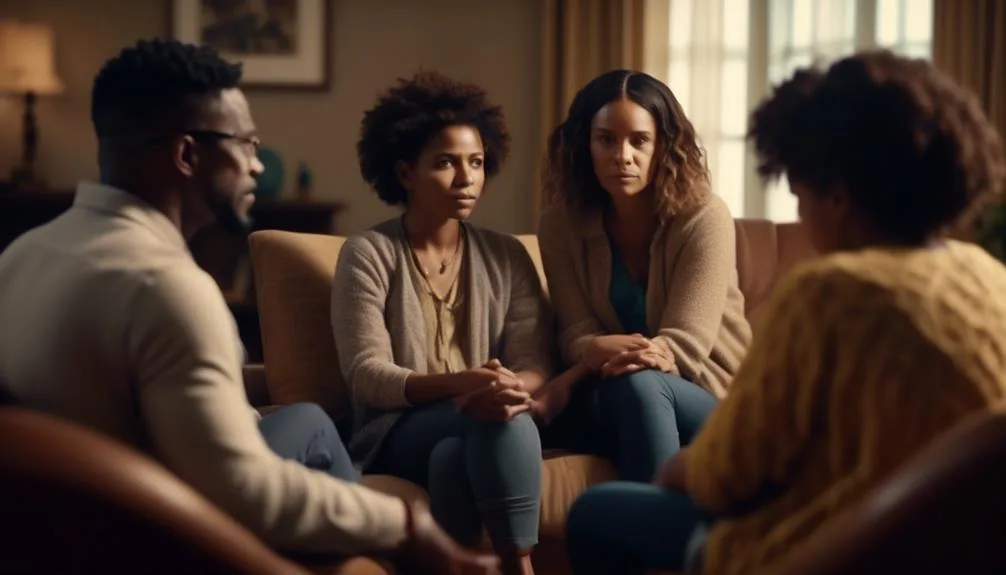Looking to take your therapy sessions to the next level? Seeking powerful questions that can truly transform the way you work with your clients? Look no further.
This discussion is all about equipping you with the tools and strategies to create deep and meaningful conversations with your clients. From initial assessments and expectations to self-reflection, personal growth, and positive CBT exercises, we'll explore a wide range of topics that will help you enhance the therapeutic experience for both you and your clients.
Get ready to unlock the potential of your therapy sessions and discover the transformative power of these questions.
Key Takeaways
- Asking about the client's reasons for seeking therapy, previous counseling experiences, and expectations from the counseling process helps to establish a foundation for the therapeutic relationship.
- Understanding the client's goals and how they define success in therapy is important for setting realistic expectations and measuring progress.
- Inquiring about the client's medical history, past treatments, and current medications helps to gather relevant information for treatment planning and potential interactions.
- Addressing any potential history of withholding information from healthcare providers ensures transparency and encourages open communication in therapy.
Initial Assessment and Expectations
When embarking on therapy, it's essential to begin with an initial assessment and set clear expectations for the counseling process. Creating rapport between you and your therapist is crucial for building a trusting and supportive relationship.
This foundation allows for open and honest communication, enabling you to explore your thoughts, emotions, and experiences more deeply. During the initial assessment, your therapist will ask questions to gain a better understanding of your unique situation, challenges, and goals.
This process helps establish goals for therapy, ensuring that you and your therapist are aligned in your desired outcomes. By setting clear expectations from the start, you can work together to create a roadmap for your therapy journey.
Self-Reflection and Personal Growth

Embark on a journey of self-reflection and personal growth by delving deep into your emotions, thoughts, and behaviors. Take the time to explore the range of emotions you're currently experiencing. What're the underlying thoughts that contribute to these emotions? How do these thoughts influence your behaviors?
It's important to challenge negative thoughts and reframe them in a more positive and empowering way. Examine your core beliefs about yourself and the world around you. Are these beliefs serving you or holding you back?
Positive CBT Exercises and Tools

Get ready to explore a range of detailed, science-based exercises and tools that will equip you with the necessary skills to reduce suffering, cope with life stressors, and promote positive change in your life.
These positive CBT exercises and tools are designed to help you identify your core beliefs and reframe negative thoughts. With these tools, you can challenge and change the negative thinking patterns that may be holding you back.
From downloadable PDFs to free resources, these exercises are accessible and suitable for therapists, coaches, educators, counselors, business professionals, and healthcare practitioners.
By using these exercises, you can gain a better understanding of yourself, improve your mental well-being, and develop healthier thought patterns.
Start your journey towards positive change today.
Couples Therapy Questions

Now that you have explored positive CBT exercises and tools to promote positive change in your life, let's shift our focus to the important topic of Couples Therapy Questions.
When it comes to improving communication and resolving conflicts in your relationship, it's crucial to ask the right questions. Start by exploring the strengths of your relationship. What makes it strong? How do you handle conflicts when they arise?
Understanding each other's love languages is also essential. How do you express love and appreciation for each other?
Finally, consider how you can improve communication and understanding in your relationship. What strategies can you implement to ensure effective and respectful communication?
Family Therapy Assessment Questions

To gain a deeper understanding of your family dynamics and foster a supportive environment, it's important to explore Family Therapy Assessment Questions. These questions can help you uncover the underlying dynamics within your family and identify areas for growth and improvement.
Here are some questions to consider:
- How would you describe the dynamics within your family?
- What're the roles and responsibilities of each family member?
- How does your family handle conflict and disagreements?
- What're the strengths and weaknesses of your family's communication?
- How can your family support each other in times of stress or crisis?
Frequently Asked Questions
How Can Clients Develop Resilience and Cope With Setbacks During the Therapy Process?
You can develop resilience and cope with setbacks by acknowledging your emotions, seeking support, and reframing negative thoughts. Remember to practice self-care, set realistic goals, and celebrate your progress along the way.
What Are Some Effective Strategies for Managing Anxiety and Stress in Daily Life?
You can find effective strategies to manage anxiety and stress in daily life. Discover techniques like deep breathing, mindfulness, and exercise. These tools can help you find peace and balance amidst life's challenges.
How Can Clients Build and Maintain Healthy Boundaries in Their Relationships?
You can build and maintain healthy boundaries in your relationships by building assertiveness and setting personal limits. This allows you to prioritize your needs, communicate effectively, and establish healthy dynamics with others.
What Techniques Can Be Used to Enhance Self-Esteem and Self-Confidence?
To enhance your self-esteem and self-confidence, try techniques like positive affirmations, setting achievable goals, practicing self-care, challenging negative thoughts, and surrounding yourself with supportive people. These strategies can help you build a stronger sense of self-worth and belief in yourself.
You can navigate and heal from past traumas or unresolved issues by exploring various healing techniques and trauma recovery methods. It's important to work with a therapist who can provide support and guidance throughout your healing journey.
Conclusion
In the realm of therapy, powerful questions have the potential to ignite transformative change.
By delving into the depths of self-reflection, personal growth, and positive cognitive-behavioral therapy exercises, therapists can guide their clients towards a path of healing and fulfillment.
These questions aren't just tools, but gateways to meaningful conversations that can reshape lives.
So, embrace the power of these therapy questions and witness the magic unfold within your sessions, as you embark on a journey of self-discovery and transformation alongside your clients.

